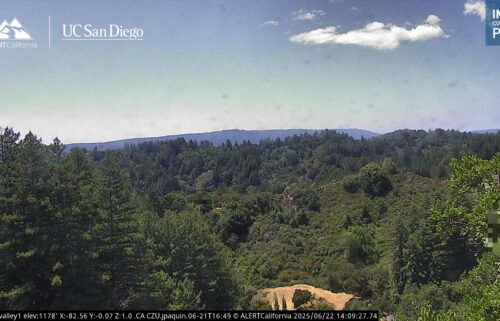Columbia University threatens to expel student protesters occupying an administration building

NEW YORK (AP) — Dozens of protesters took over a building at Columbia University in New York early Tuesday, barricading entrances and unfurling a Palestinian flag from a window in the latest escalation of demonstrations against the Israel-Hamas war on college campuses nationwide. The school promised they would face expulsion.
The occupation at Columbia — where protesters had shrugged off an earlier ultimatum to abandon a tent encampment Monday or be suspended — unfolded as other universities stepped up efforts to clear out encampments. Police swept through some campuses, spurring confrontations with protesters and plenty of arrests. In rarer instances, university officials and protest leaders have struck agreements to restrict the disruption to campus life.
And as cease-fire negotiations appeared to gain steam Tuesday, it wasn’t clear whether those talks would inspire campus protesters to ease their efforts.
Protesters on Columbia’s Manhattan campus locked arms in front of Hamilton Hall early Tuesday and carried furniture and metal barricades to the building, among several that were occupied during a 1968 civil rights and anti-Vietnam War protest. Posts on an Instagram page for protest organizers shortly after midnight urged people to protect the encampment and join them at Hamilton Hall. A “Free Palestine” banner hung from a window.
An autonomous group reclaimed Hind’s Hall, previously known as ‘Hamilton Hall,’ in honor of Hind Rajab, a martyr murdered at the hands of the genocidal Israeli state at the age of six years old,” CU Apartheid Divest posted on the social platform X early Tuesday.
Hamilton Hall opened in 1907 and is named for Alexander Hamilton — one of the founding fathers of the United States — who attended King’s College, Columbia’s original name.
The takeover occurred nearly 12 hours after Monday’s 2 p.m. deadline for the protesters to leave an encampment of around 120 tents or face suspension.
In a statement Tuesday, Columbia spokesperson Ben Chang said, “Students occupying the building face expulsion.” Chang said the university had given protesters a chance to leave peacefully and finish the semester, but that those who didn’t agree to the terms from Monday were being suspended — restricted from all academic and recreational spaces, allowed only to enter their residences, and, for seniors, ineligible to graduate.
“Protesters have chosen to escalate to an untenable situation — vandalizing property, breaking doors and windows, and blockading entrances — and we are following through with the consequences we outlined yesterday,” he said.
The public safety department said in a statement that access to the campus was limited to students living in the residential buildings and essential employees. There was just one access point into and out of campus.
New York Police Department Chief Jeffrey Maddrey said Tuesday that officers won’t enter Columbia’s campus without a request from college administration or an imminent emergency.
Protesters have insisted they will remain at the hall until the university agrees to three demands: divestment, financial transparency and amnesty.
At many campuses, including Columbia, the conflict over protests appeared to be coming to a head.
The standoffs have drawn concern from the White House. National Security Council spokesperson John Kirby said President Joe Biden believes students occupying an academic building is “absolutely the wrong approach,” and “not an example of peaceful protest.”
The office of the U.N. human rights chief, Volker Türk, meanwhile, expressed concern about “heavy-handed steps” taken to dismantle protests on U.S. campuses, while stressing that antisemitic, anti-Arab and anti-Palestinian comments were “totally unacceptable and deeply disturbing.”
At California State Polytechnic University, Humboldt, where protesters have occupied two buildings, dozens of police officers in helmets and carrying batons marched onto campus early Tuesday and cleared both halls. The university said 25 people were arrested and there were no injuries. The sweep was broadcast on the Facebook page of KAEF-TV, a satellite of KRCR-TV, until police detained the reporter.
The university earlier announced a “hard closure,” meaning that people were not allowed on campus without authorization. The university posted a shelter-in-place order on its website at 3:24 a.m. The order was lifted several hours later, but residents were warned to stay in living, dining and market areas.
At Virginia Commonwealth University in Richmond, police and demonstrators clashed Monday night as officers took down tents, charged the line of demonstrators, deployed chemical agents to disperse the crowd, and made arrests, the Richmond Times-Dispatch reported. Some protesters hurled water bottles and other objects at police.
Yale authorities on Tuesday morning cleared an encampment after protesters heeded final warnings to leave, university officials said. No arrests were reported. Demonstrators said on social media that they were moving their gathering to a sidewalk area. The encampment was set up Sunday, six days after police arrested nearly 50 people, including 44 students, and took down dozens of tents.
Dozens of people were arrested Monday during protests at universities in Texas, Utah, Virginia and New Jersey, while Columbia said hours before the takeover of Hamilton Hall that it had started suspending students. At the University of Texas at Austin, 79 people involved in the Monday protest were jailed, according to the Travis County sheriff’s department, most charged with criminal trespass.

